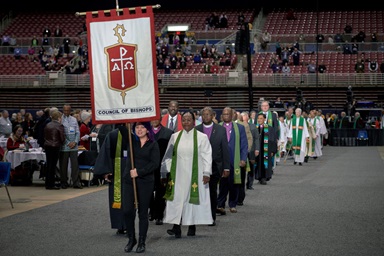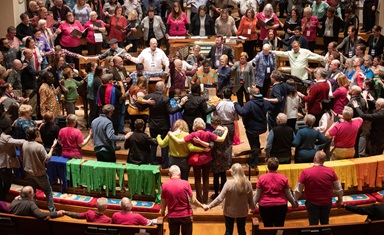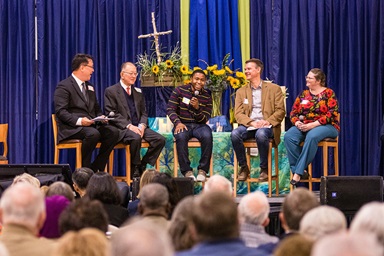United Methodists tried to come to terms with a General Conference that was meant to unify but instead underscored divisions and had all sides acknowledging a high level of pain.
“Catastrophic” was the summary judgment of the Rev. James Howell, a Western North Carolina Conference delegate.
“The church as we’ve known it will not be. It’s going to fracture in ways — different ways,” he said.
Patricia Miller served on the Commission on a Way Forward that bishops appointed to help come up with legislative options for addressing the denomination’s impasse on homosexuality, and the Traditionalist Plan she supported prevailed.
“There is no joy for any of us in this whole debate,” said Miller. “It’s painful for all of us.”
The special legislative session was called by bishops to try to deal with the denomination’s long conflict over how accepting to be of homosexuality. General Conference is The United Methodist Church’s top legislative assembly, comprising delegates from around the world.
In the end, delegates passed by a 438-384 margin the Traditional Plan, which retains church law restrictions against homosexuality and seeks stricter enforcement.
Going down in defeat was the One Church Plan, backed by most of the denomination’s bishops. It would have allowed U.S. churches and conferences to host same-sex unions and ordain openly gay clergy.
The effects of the legislation that passed are unclear given constitutional questions that will be addressed by the Judicial Council, the denomination’s supreme court, which meets in April. Parts of the plan already have been declared unconstitutional.
But the response on the last day of General Conference by supporters of full inclusion for LGBTQ persons included multiple demonstrations, tearful and often angry floor speeches, accusations of ethics violations by traditionalist organizers, and challenges to parliamentary decisions by a presiding bishop.
Bishop Julius Trimble, of the Indiana Conference, was among many commenting on the level of pain.
“People, particularly young people, are hurting,” he said in a Twitter post.
The Rev. Sky McCracken, a Memphis Conference delegate, spoke bluntly about the process he witnessed.
“I believe General Conference has become an intractable body,” he said. “We have legislated ourselves into ineffectiveness and lessened our witness.”
The Rev. Forbes Matonga, a delegate from the West Zimbabwe Conference, supported the Traditional Plan. He said the Bible demands that marriage be limited to one man and one woman.
But Matonga called for a new approach to United Methodist governance.
“As long as it’s parliamentary, it’s about winning and losing, and naturally it creates some cracks,” he said.
Bishop Grant Hagiya lamented the passage of the Traditional Plan, but said that United Methodist polity, combined with deep divisions about LGBTQ inclusion, almost guaranteed an unhappy outcome.
“We have to find a new way to do this,” said Hagiya, who leads the church’s Los Angeles Area.
The Rev. Adam Hamilton, a Great Plains delegate, said he’s heard from many people who wonder if they can remain with The United Methodist Church, given the Traditional Plan’s passage.
“I’m not ready to give up on the church at this point, but I do think that enforcement with teeth is going to have a lot of people thinking about leaving,” he said.
The Rev. Donna Pritchard, delegate from the Oregon-Idaho Conference, promised that the Western Jurisdiction — which elected the Rev. Karen Oliveto, a lesbian, as a bishop — would remain and keep to its progressive path.
“The Western Jurisdiction intends to continue to be one church, fully inclusive and open to all God’s children across the theological and social spectrum,” she said.
Leaders of the United Methodist seminaries joined in a statement imploring that the Traditional Plan be rejected, arguing it would drive young people in the U.S. from ministry in the denomination.
“If the Traditional Plan passes, we will very soon lose an entire generation of leadership here in the United States,” they said.
The Rev. David McAllister-Wilson, president of Wesley Theological Seminary, elaborated his concern in an interview.
“The church that was revealed in this debate here in St. Louis is not the church we understand ourselves to be serving,” he said.
The Rev. Kah-Jin Jeffrey Kuan, president of Claremont Theological Seminary, said the seminaries’ unhappiness with the Traditional Plan’s passage runs deep.
“Some of our seminaries may consider whether to leave the denomination,” he said.
The Rev. Susan Henry-Crowe, top executive of the denomination’s United Methodist Board of Church and Society, registered her dismay in a statement.
“The United Methodist Church’s special General Conference failed Tuesday (Feb. 26) to love LGBTQIA people, recognize their gifts in the church, maintain our unity in the midst of diversity, and to live out our Gospel mandate to seek justice and pursue peace,” she said.
But the Rev. Isaac Bodje, a delegate from Côte d’Ivoire, said the outcome was required by the Bible and Christian tradition.
“We have among ourselves two different approaches,” he said. “Is it the world impacts the church, or the church impacts the world?
The Rev. David Watson, a dean and New Testament professor at United Theological Seminary in Dayton, Ohio, said the legislative gathering produced no real winners.
“This conference has been heartbreaking and that’s because of the damage it’s done to our relationships,” he said.
The Rev. Wellington Chiomadzi, a Zimbabwean student at Garrett-Evangelical Theological Seminary in Evanston, Illinois, had a similar reaction immediately after the vote for the Traditional Plan.
“The decisions will have a big impact on the future of the church,” he said. “I am not sure relationships across the church are going to be the same after this. I am very anxious.”
The Rev. Rob Renfroe is president of Good News, the unofficial traditionalist advocacy group within the denomination and an organizing force behind the Traditional Plan. He was glad it passed but sorry for the circumstances.
“I think people are frustrated, hurt, angry,” he said. “They’re finding different ways of expressing that.”
Renfroe put much of the blame on the bishops, saying the One Church Plan was essentially a reprise of efforts that had failed at previous General Conferences.
He insisted traditionalist groups had been open to new ideas, but not to an “agree to disagree” approach.
“They forced a fight on us,” he said. “We’re not going to walk away from what we think is important for the church. We had to create a strong effort to defend what we think is biblical.”
Renfroe suggested it may soon be time for a non-legislative summit to consider options.
“My hope is that after the leaders process what’s happened, they will realize that it’s now time to do what we should have done coming out of Portland (site of the 2016 General Conference), which is sit down together and say, ʽHow can we begin to work to create a solution so that we don’t stay in this narrative of coming and fighting,” he said.
The Rev. Stan Copeland, pastor of Lovers Lane United Methodist Church in Dallas, helped lead the Uniting Methodists group in its support of the One Church Plan. But he agreed that it’s time to think creatively and hope anew.
“There has to be a real meeting of minds and hearts, and I think there will be, because we have reached the bottom of the barrel as far as our fighting and squabbling.”
Hodges is a Dallas-based writer for United Methodist News Service. Heather Hahn, Kathy Gilbert, Linda Bloom, the Rev. Taylor Burton-Edwards and Joey Butler contributed. Contact them at 615-742-5470 or [email protected]. To read more United Methodist news, subscribe to the free Daily or Weekly Digests
Like what you're reading? Support the ministry of UM News! Your support ensures the latest denominational news, dynamic stories and informative articles will continue to connect our global community. Make a tax-deductible donation at ResourceUMC.org/GiveUMCom.




